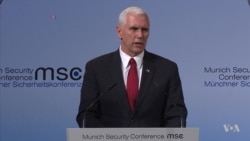In his first major foreign policy speech, U.S. Vice-President Mike Pence has said that America will be ‘unwavering’ in its support for the NATO alliance, but warned European allies that they must step up defense spending.
“I bring you this assurance - the United States of America strongly supports NATO and will be unwavering in our commitment to this transatlantic alliance,” Pence told delegates at the Munich Security Conference Saturday.
He repeated calls for European allies to keep their NATO commitment of spending 2 percent of GDP on defense.
“The President of the United States expects our allies to keep their word, to fulfill this commitment and for most that means the time has come to do more."Amid controversy over the Trump administration’s ties to Moscow, the vice-president said the U.S. would continue to hold Russia accountable, “and demand that they honor the Minsk agreements, beginning by de-escalating the violence in eastern Ukraine. And know this. The United States will continue to hold Russia accountable, even as we search for new common ground.”
Russia sees new world order
Among the hundreds of delegates listening to Vice-President Pence was Russian Foreign Minister Sergei Lavrov. He took to the stage a few hours later - and said the world was at a moment of change.
“The responsible leaders have to make a choice. I hope that they will choose a democratic and fair world order. You might want to call it a post-West one,” he said.
Questioned on accusations that Russia had hacked computers and tried to influence the U.S. election, Lavrov said he had found no evidence of this.
“Which kind of relations do we want with the U.S.? Pragmatic relations with mutual respect and acknowledgement of our responsibility for global stability.”
Lavrov later told reporters that after a meeting with his counterparts from France, Germany and Ukraine, the four countries had agreed to try to implement a cease-fire in eastern Ukraine starting Monday, alongside the withdrawal of heavy weapons from the front line.
Fighting has escalated in recent weeks, threatening to sink the Minsk accords, an agreement signed in 2015 that aims to secure a cease-fire and more autonomy for eastern rebel-held regions of Ukraine.
Russian media reported Saturday that President Vladimir Putin had signed an executive order recognizing passports issued by pro-Moscow rebel groups in Donetsk and Luhansk. The move is likely to further escalate tensions with Kyiv and the West.






